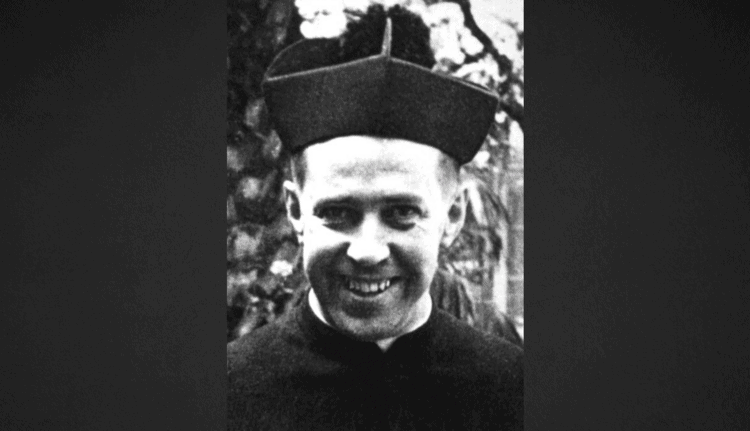The following is a translation of a reflection by St. Alberto Hurtado about his visit to America in 1946. It is published in Spanish here. Today, August 18th, is St. Alberto Hurtado’s Feast Day.
I just returned from the greatest country in the world. At least that’s what the leader of the second greatest, Churchill, said about the U.S. while staying in the largest and most comfortable hotel on the globe, the Waldorf Astoria. The U.S. has the tallest building: the Empire State with 102 floors. They have Radio City, the largest theatre, teeming with people all day and night. Subterranean tunnels cross under the rivers. There are three, four or more means of transportation. They have all the records: speed, four thousand kilometers in four hours; production, five hundred automobiles an hour, soon to be a thousand. They have 46% of the world’s gold. There’s fantastic technical progress. Death has been delayed, life prolonged. From Washington DC, a plane takes off every three minutes. Their great ships can cross all the oceans. There are millions of automobiles and refrigerators. Yet, as someone has said, “So what?”
What was my impression as a whole? Material things are not enough. Civilization does not satisfy. Comfort is a good thing, but it’s not where happiness is found. It gives too little and costs too much! These toys rob people of their true greatness. The price of all this “lifestyle” for the great majority is its own destruction, losing touch with the spirit, blindness towards the supernatural.
People of progress dominate matter. They are clean, hygienic, well built for sports, healthily fed, well clothed, with access to music and a car, a nice car! Perhaps for some, there are trips around the world, comfortable homes, spouses for as long as one gets along with them. You eliminate sickness and die at seventy. What more can you ask?
Having just returned from this splendid trip via cargo ship, nice and slow, the only passenger, with time to pray, think and write, I reflected, “Is this all there is?”
I look up at these splendid, magnificent, and imposing heavens that protect us: again, is this all there is to life? Seventy years with all these conveniences? Humanity is the king of creation. Is it all for this? Is human progress merely the possession of a bathroom, a radio, a washing machine, and a car? Is this the greatness of humanity? Is there nothing more than this? Is this what life is all about? All the while, we wait for the next war that we can all sniff in the winds of our times. We await it with fear and trembling.
Empire State, Chrysler: how much longer will you stand? The Ford, Packard and Chrysler factories, how long will you last? Horrified by the threat of nuclear war, not long ago, Einstein wrote that we now have atomic energy at our disposal. We have recently managed to achieve fission, and, as a result, two thirds of humanity might perish! Is this life? Is this our crowning achievement?
And then I look at the calm, serene night sky. I see the stars sending their gentle light. And these words resound in my ears: “God so loved the world that he gave us his only Son” (John 3:16). God loved me, even me! Who? God! The Creator of all energy, of the stars and the earth, of humanity, of perhaps two thousand generations of people who have lived on the earth and millions more that may come. This immense God before whom insignificant humanity disappears. God is so much greater than we are!
What does God think of humanity? Of human life? Of the meaning of our existence? Does God condemn these inventions, this progress, this eagerness to discover effective new medicines, fast cars, planes with zero risk? No. Rather, God is overjoyed with these efforts to better this life of ours. But for those who still have ears to hear despite the noise around them, God tells us, “I have come that they may have life and have it in abundance” (John 10:10).
Listen, son. Listen, daughter. It’s me. Who? Me, Jesus, Son of God. Jesus, true God. Me, the eternal God. I have come. I have journeyed, a very long journey. From the infinite to the finite, a journey so long it scandalizes the wise and rattles philosophers. From the infinite to the finite! The eternal to the temporal! God to the creature? Yes, that’s it! This journey is real. I have come. This is my journey!
For humanity. The only reason for this journey: humanity. That minuscule yet great creature! Because though small, humanity is great. The greatest creature in the universe? Greater than the stars? I have never made a journey for them, even less suffered for them! But for humanity, yes.
For humanity, but perhaps you do not understand me: I have come for you, for you! I do not love the masses, I love each person: each man, each woman.
I have come that you may have life. Life? What life are you talking about? Life, true life. The only life that can justify God’s journey is divine life: “That we might be called and be children of God” (1 John 3:1). We are called and truly are God’s children! The eternal God does not make such a journey except to give us a gift of great price: nothing less than God’s own divine life, participation in God’s nature given through grace.
Do we believe in this life? There are Catholics, like the one I met on my trip who said to me, “Another life? No, Father, you’re joking.” There are Catholics who have never thought about this life. In fact, the majority are not even concerned about it. They ignore it. And yet this is the only true life. Whoever has this life, truly lives. Whoever does not possess it–though healthy, rich, wise and blessed with friends–is dead.
“What does it profit a man if he gains the whole world but suffers the loss of his own soul?” (Matthew 16:26). “He who wishes to save his life will lose it and he who loses his life for my sake will find it” (Mark 8:35). So go the old refrains of the Church. This life, divine life, is the only thing necessary: so great because so old, or better yet, so old because so great. So necessary, so irreplaceable! The person who enjoys all civilization can offer cannot extinguish the echo of these words, and, if he should do so, he will die, not only to that life but even to his own human life.
“That they may have life in abundance.” There is a poor sort of life, hardly to be called life; a life of infidelity to grace, spiritual deafness, lack of generosity; and there is a rich life, full, fruitful, and generous. This is the life to which Christ has called us. This is holiness. And Christ wants Christians of integrity who do not close their souls to any invitation of grace, who let themselves be possessed by this invading wave of grace, who allow themselves to be taken over by Christ, claimed by him. Life is truly life in the measure that we possess Christ, in the measure that we are Christ–through knowledge, love, and service.
God wants to make me a saint! God wants twentieth century style saints: Chilean style, high school style, lawyer style, each fully reflecting the divine life. This is the greatest thing in the world! Greater by far than the Empire State Building, than a Ford factory with a daily production of eight thousand automobiles. Of greater value for humanity than the discovery of atomic energy, a vaccine or penicillin.
Here we must say along with the Samaritan woman, “Lord, give me this living water so that I may no longer thirst” (John 4:15). Or like Nicodemus, “How can I be born again when I am an old man?” (John 3:4). This is God’s gift that God desires to give me because “God so loved the world that He gave us his only begotten Son” (John 3:16). If God has given us God’s only Son, what would God now refuse us?
Lord, give us this life, life in abundance.


